
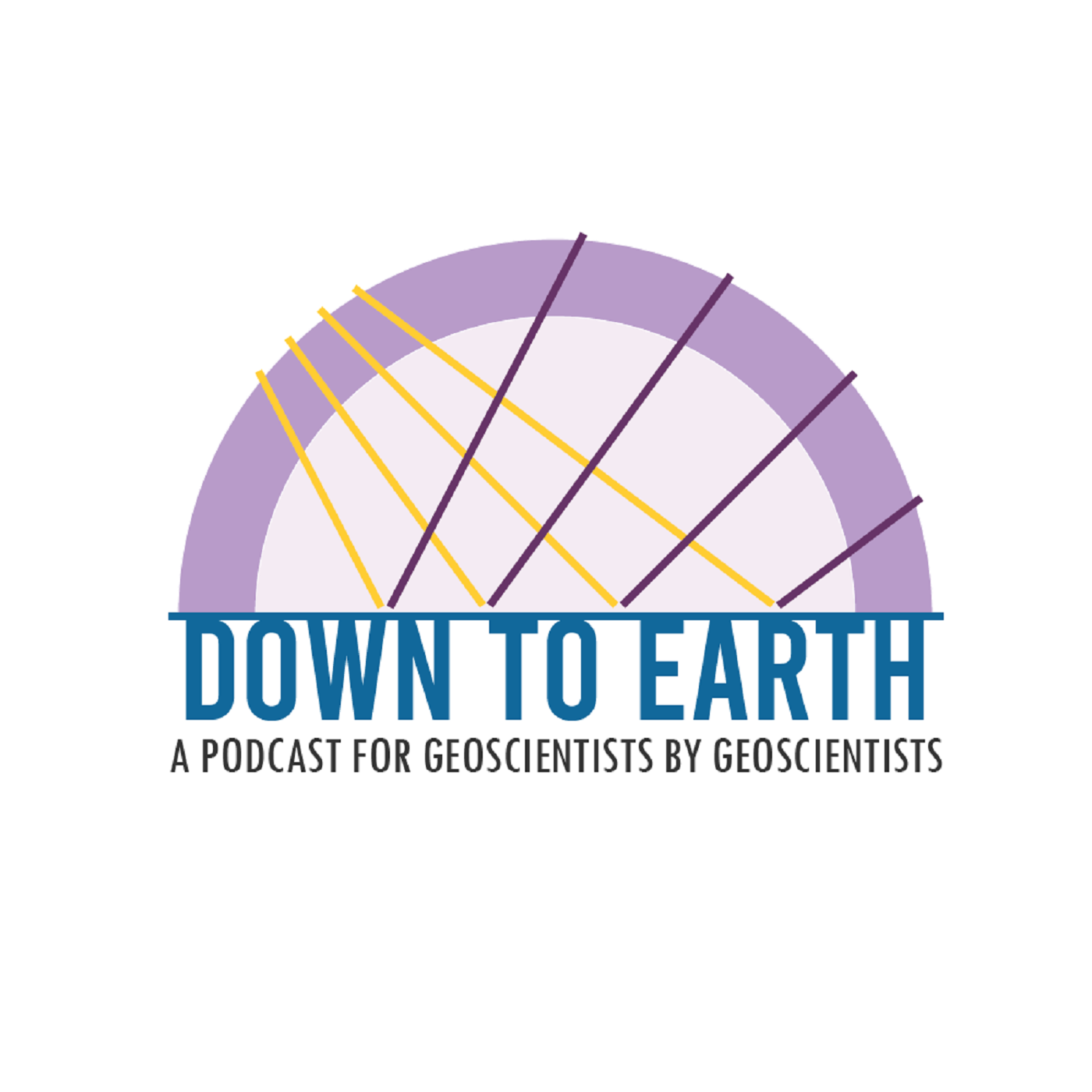
19.5K
Downloads
55
Episodes
Welcome to “Down to Earth”, a 30-minute podcast about innovative geoscience and the incredible people behind it. Each week, we host a different guest to talk about science, careers, and passions. From stories about meeting their idols, to investigating their science superpowers, and all the fascinating research and engineering projects in between, Down to Earth is sure to become your quick and compelling catch-up on the people and the work in geoscience. This podcast is presented by the IEEE Geoscience and Remote Sensing Society.
Episodes
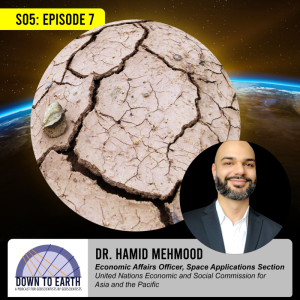
Monday Nov 20, 2023
S05E07 Down to Earth: Water Resources
Monday Nov 20, 2023
Monday Nov 20, 2023
According to the UNU Institute for Water, Environment and Health, water-related disasters (WRDs), including floods and droughts, account for 90% of natural disasters. These disasters result in significant loss of life each year, not to mention the billions spent on managing and rebuilding afterwards. As the global water crisis continues to grow, so too does our need for tools, techniques, and policy that will help us more effectively predict, respond to, and prevent WRDs. In this episode, we speak to Dr. Hamid Mehmood, Economic Affairs Officer with United Nations ESCAP to find out how we can address WRDs with technology.
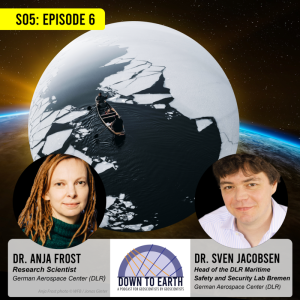
Monday Nov 13, 2023
S05E06 Down to Earth: Sea Ice
Monday Nov 13, 2023
Monday Nov 13, 2023
What’s the difference between glaciers and sea ice and why do we need to be studying sea ice to better understand climate change? In this episode, we speak to two experts who study sea ice in the arctic and antarctic respectively. Dr. Anja Frost and Dr. Sven Jacobsen share their concerns about the pressing issue of the Arctic’s vanishing sea ice, the need to understand the relationship between ocean waves and sea ice depletion, and how remote sensing techniques are improving our understanding of Arctic sea ice changes. Together, both Anja and Sven use their expertise to support ships travelling through the arctic. Their research helps to optimise ship navigation, reduce emissions, and improve the technologies and processes for studying sea ice using remote sensing.
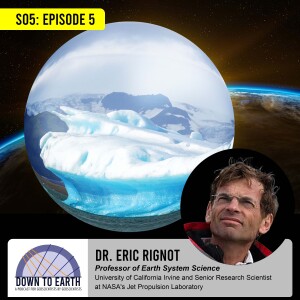
Monday Nov 06, 2023
S05E05 Down to Earth: Glaciers
Monday Nov 06, 2023
Monday Nov 06, 2023
As far back as 2014, Dr. Eric Rignot, specialist in glaciology, has been informing us that some of our glaciers are melting faster than we can save them. Yet, this knowledgeable and passionate scientist continues to advocate for hope. In this episode we’ll dive deep into the meltwater to not only understand glacier behaviour, but how we can proactively deal with the results.
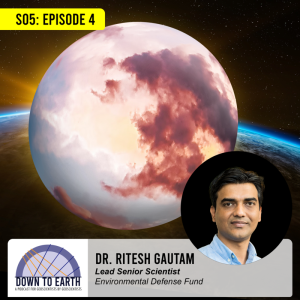
Monday Oct 30, 2023
S05E04 Down to Earth: Aerosols
Monday Oct 30, 2023
Monday Oct 30, 2023
Methane is a dangerous gas has more than 80 times the warming power of carbon dioxide over a 20-year period. Methane is a major contributor to global warming. But the good news is, unlike CO2, methane has a very short atmospheric lifespan – around 10 years to be exact. In this episode, we speak with Dr. Ritesh Gautam who is an expert in atmospheric sciences, explores the impact of methane as a potent greenhouse gas and shares news of a new satellite mission that will help us cut methane emissions in half by 2030!
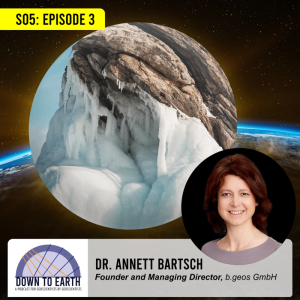
Monday Oct 23, 2023
S05E03 Down to Earth: Permafrost
Monday Oct 23, 2023
Monday Oct 23, 2023
Whenever we think of greenhouse gases, carbon dioxide is top of mind. But a more nefarious gas is gaining notoriety: Methane. Not just restricted to agricultural emissions, methane is also found in the Earth’s permafrost, which is melting at an increased rate due to climate change. It’s a vicious cycle that we seriously need to interrupt. So in this episode, we delve into the critical issue of permafrost thaw and its implications for methane release with Dr. Annett Bartsch. Dr. Bartsch, a leading researcher of permafrost, shares the satellite observations and modeling techniques used to track permafrost thaw and highlights the consequences of methane emissions on our climate system.
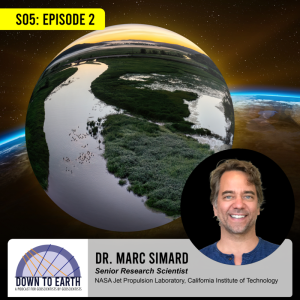
Monday Oct 16, 2023
S5E02 Down to Earth: Wetlands
Monday Oct 16, 2023
Monday Oct 16, 2023
Wetlands are the Earth’s greatest natural carbon stores, however, since 1900, we have lost 64% of our wetlands due to both human activity and climate change. Coastal wetlands and deltas–wetlands that form as rivers–are particularly vulnerable due to their position at the land-sea interface and many are, in fact, sinking. In this episode, we speak to Dr. Marc Simard about the crucial role of wetlands in climate regulation and adaptation. We also dig into his Delta-X project to look at how he and his team are combining remote sensing and in situ measurements to understand how the Mississippi River Delta is growing and sinking, and how we can apply this research to protecting deltas around the world.
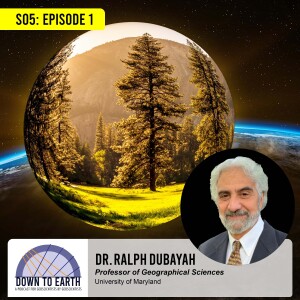
Tuesday Oct 10, 2023
S5E01 Down to Earth: Forest Ecosystems
Tuesday Oct 10, 2023
Tuesday Oct 10, 2023
The Global Carbon Cycle refers to the continuous flow of carbon from the land and water, through the atmosphere and living organisms. Within the cycle there are carbon sinks and carbon emitters. As one of the largest reservoirs of carbon on Earth, forests play a huge role in the global carbon cycle. But how do we know? In this episode, we speak to geoscientist Dr. Ralph Dubayah to explore the applications of GEDI and NISAR in assessing carbon capture in Earth's forests. Dr. Dubayah sheds light on the incredible capabilities of GEDI, a lidar-based instrument on the International Space Station, which measures forest structure in three dimensions, providing precise estimates of biomass and carbon content. He also shares insights into NISAR, a forthcoming joint NASA-ISRO mission that uses synthetic aperture radar to track surface deformation and offer a comprehensive understanding of forest biomass changes. Throughout the episode, Dr. Dubayah showcases exciting discoveries made possible by these technologies, highlighting their potential for revolutionizing our understanding of forest carbon capture and its crucial role in mitigating climate change.
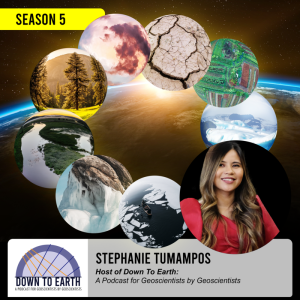
Tuesday Oct 03, 2023
Down to Earth: Season 5 Trailer
Tuesday Oct 03, 2023
Tuesday Oct 03, 2023
In a world grappling with the pressing challenges of climate change, I bring you stories of optimism, resilience, and scientific insight: Welcome to Season five of Down to Earth: A podcast for geoscientists, by geoscientists!
This season is being sponsored by The Remote Sensing Environment, Analysis and Climate Technologies technical committee of the IEEE Geoscience and Remote Sensing Society. Together, we'll be speaking with some amazing geoscientists who have dedicated their lives to understanding the intricate workings of our planet's climate system.
From uncovering the secrets behind the stunning rate of glacier melt in our polar regions, to unraveling the climate impacts on our food systems, their work provides us with the knowledge and insight to change our current trajectory towards a much brighter future.
I also gather tips from these brilliant minds for how we can each contribute, one change at a time, to our survival in the face of global warming!
So, get ready to be inspired, enlightened, and empowered as we bridge the gap between scientific research and the urgent action needed to protect our home.
Tune in this fall to the Down to Earth podcast and be part of the global movement to create a sustainable and resilient future for generations to come.
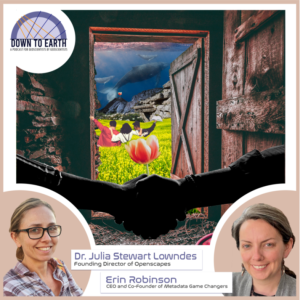
Sunday Jun 18, 2023
S4E10 Down to Earth: Training for culture change in Open Science
Sunday Jun 18, 2023
Sunday Jun 18, 2023
The open science movement is an experiment, but it’s an experiment that has a lot of merit when it comes to its vision of equitable transparency, accessibility and collaboration for better science, and a better world. So how do we begin to transition our own practices towards those of open science? In this episode, we speak with Julia Stewart Lowndes, Founding Director of Openscapes, and her collaborator, Erin Robinson, CEO and Co-Founder of Metadata Game Changers, about Openscapes, an organization that engages, empowers, and amplifies researchers with open habits and mindsets for data-intensive science.
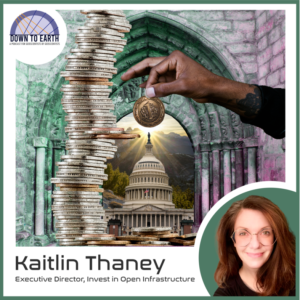
Sunday Jun 04, 2023
S4E09 Down to Earth: Getting the Green for Open Science
Sunday Jun 04, 2023
Sunday Jun 04, 2023
Open science has been an almost exclusively voluntary endeavor for the past two decades, with passionate individuals piecing together collaboratives, nonprofits, grants, and donations to support their work of ensuring science is open and accessible. A relief to these dedicated individuals, as the concept of open science has gained in popularity, so too has new funding started to emerge. However, alongside the boon of no longer having to do open science as a side hustle, there are also unanticipated consequences to funding what was originally a voluntary endeavor. In this episode, we speak to Kaitlin Thaney, Executive Director of the nonprofit initiative, Invest in Open Infrastructure about the exciting opportunities and potential pitfalls of building financial capacity for open science.